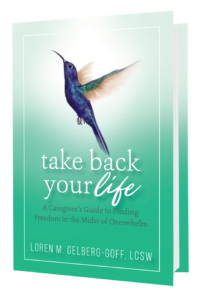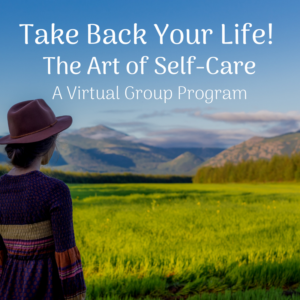Have you ever been faced with looks from a family member that twist your gut into a knot…or a snide comment that makes your skin crawl?
Do those looks and comments – and perhaps a history of arguments or guilt trips – keep you from speaking up when you feel someone has crossed a line with you, rather than “stir things up again” or face an unpleasant backlash?
Been there, done that… and it doesn’t feel good.
Our emotional and psychological “boundaries” play a huge role in defining and protecting our personal dignity, and healthy boundaries come from love, not fear.
Whenever you swallow your pain, don’t speak up, don’t set a limit, or otherwise give up on yourself in the face of challenges, disagreements or uncertainties with others, you are guaranteeing that nothing is going to change. All you are doing is reinforcing a pattern that brings you pain and internal distress.
Even worse, sometimes the consequences are not just internal…think about how certain other relationships in your life are negatively affected because you have not set those boundaries….
We teach people how we’re willing to be treated. So if it’s “normal” for you to have your gut in knots, and make excuses for not addressing the issues, behaviors and attitudes that cause you distress, then the people in your life will continue to operate on the premise that what they do and say is acceptable…even though their actions or words may be far from it.
So think about it: How long have you tolerated your discomfort and distress? How long has it been since you first began to believe that by keeping silent you were keeping the peace?
Most importantly, are you ready to experience freedom from this self-imposed ritual of silent suffering over others’ heedless behavior? You can change this pattern, and end that suffering.
The people closest to you – whether it’s your parent for whom you’re a caregiver, your siblings, or other relatives – have the longest history with you, and therefore the strongest patterns and expectations of you. Their behaviors, beliefs and attitudes have well-established by now, but they really can be changed! It starts with you taking the first step.
When you feel a negative reaction – discomfort, upset, annoyance, frustration, maybe even distress – when a family member makes a request (or demand!) of you, the first thing to do is take that absolutely essential slow, deep breath. It will give you a foundation, in both a sense of your power and a peaceful mindset, for starting the process of making a change that honors and respects your needs.
Start with small steps…maybe some no one but you will even be aware of. It could be letting some phone calls go to voicemail, rather than feeling obligated to answer them every time. Once you experience the benefit of waiting until you’re in a calm, clear space (physically and emotionally) to return a call, maybe you’ll decide that you can also delay a visit to someone who is demanding your help with something non-critical by a few hours, or days.
These choices may feel radical – and even “irresponsible” or “selfish” – when you first consider them, but that’s just the old ritual of obligation without boundaries trying to reassert itself.
Maybe it’s running an errand for someone later, rather than disrupt your entire schedule in order to do it immediately…just because they asked. Or perhaps you decide to sleep an extra half hour…or go to sleep an hour earlier than you usually do. It’s not always a boundary between you and someone else; sometimes it’s saying “No” – or “Yes!” – to yourself!
Have you been putting off getting to the gym or taking a walk, like you’ve been promising yourself for months (or years?!), because “dad needs me” – and you decided he shouldn’t have to wait? Or have you just been “too busy” to schedule time for these moments of profoundly important self-care?
The goal is to find a balance where we are taking as good care of ourselves as we do of others in our life. Get in the habit of taking the following steps as reminders that setting boundaries is one of the first steps in achieving that balance in your life:
- Stop! Breathe! Focus! This crucial first step gives you that “reset” moment so you can respond rather than react.
. - Ask Yourself: What is My Desired Outcome? This ever-important question must be answered with a positive statement of an action or result over which you have full control!
. - Allow yourself to be aware of what has kept you from setting this boundary in the past. Was it fear of the other person’s reaction? Fear of your own discomfort at doing something different and unexpected? Fear of upsetting the delicate balance that has been forged thus far within your family? Standards of perfection in meeting your caregiving responsibilities? Whatever it is, don’t spend time regretting or criticizing yourself for it – simply become aware that it has had a powerful say in how you’ve been making decisions up till now.
. - Feel the discomfort as a normal part of the process. Acknowledge that whether you fall into old habits or do something new, either way you will feel discomfort until new habits are established. Keep consciously choosing which discomfort you are willing to live with…and it may continue to be the old one for a while, until you’re ready to make a change. NO JUDGMENTS, just awareness!
Practice these small steps and the bigger issues will seem less impossible over time. Remember that if you don’t get used to taking the small steps, the big changes most likely will never happen.
Setting new boundaries takes practice. Have patience with yourself…and with others’ reactions. Making changes such as this also takes perseverance, and above all courage – and I celebrate your bravery and commitment for taking it on, to create a life that fulfills you instead of wearing you down!
If you feel guilty making some of these changes, check out the Guilt Detox Mini course… It’s free and a great way to get started on Taking as good care of yourself as you do of those you love. It provides guidance that can help you learn faster and start succeeding sooner. Click here to gain immediate access.
Always know you have options as you go through the challenges of caregiving, and beyond!
…And we breathe….
~ Loren
(201) 489-6720
Loren@LorenGelbergGoff.com




What an excellent and practical article. It is the little things we ‘take back’ that help us feel more ease, peace, and maybe even a sense of control over our situation. Boundaries are vital in caregiving. Thanks Loren <3